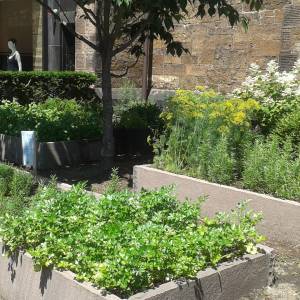The ripple effect of contributions to the Hunger Program, mostly through One Great Hour of Sharing, creates waves of support for organizations like World Hunger Relief, which trains young people like Kaley and Ester, and many more. World Hunger Relief, based on their farm in Waco, Texas, also achieves the difficult task of making connections between local hunger and global hunger. Here are the profiles of two of their interns from their website. We are proud to be a partner!
 Intern Profile | Kaley Necessary
Intern Profile | Kaley Necessary
Food Systems Intern & Garden Club Coordinator
Kaley comes to us from Indiana Wesleyan University, where she graduated in the spring of 2014 with a Bachelor of Science degree in Biology and Pre-Medicine. She also received a minor in International Community Development. Passionate about public health, Kaley became an intern with the Uganda Village Project. She was in Iganga, Uganda for 3 months where she worked as a public health educator conducting weekly education sessions on malaria, sexually transmitted infections, intestinal parasite prevention, family planning methods, nutrition, hygiene and sanitation, and safe water. Her “desire to see people take ownership of their health and well being” grew stronger while in Uganda.
Kaley has strong passions for development and agriculture. In Uganda, she realized her desire to address public health issues through the gateway of agriculture. After her time at World Hunger Relief, Kaley will continue to pursue knowledge of development and agriculture to prepare herself to serve in a developing country. She also hopes to apply her training in a community somewhere in the United States to help develop local food systems.
 Intern Profile | Esther Honegger
Intern Profile | Esther Honegger
Livestock Intern
Coming from Lake Zurich, IL, Esther graduated from the University of Illinois Urbana-Champaign in 2013. She received a Bachelor of Science degree in Animal Science with a minor in Chemistry. Throughout college, Esther was involved in InterVarsity Christian Fellowship and the Pre-Veterinary Club at her school. She was also able to intern at the Champaign County Humane Society, where she monitored the medical and behavioral statuses of the resident animals.
During her participation in InterVarsity Christian Fellowship, Esther had the privilege to attend a 3-week mission trip to Malawi, Africa, where she served at an orphanage. She was able to teach the children about basic animal biology and directed her teammates in helping her with daily activities.
Esther is using her time at WHRI to learn practical skills in animal agriculture so that she can serve people in a more comprehensive way. She plans to use this knowledge and the knowledge from her studies “to benefit the people of developing nations who don’t have the opportunities to learn about animal biology and health in the depth that I have.”

 “Most of them wore them to school on Monday!”
“Most of them wore them to school on Monday!”





